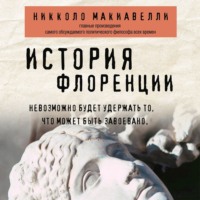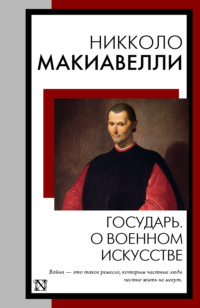
Полная версия
The Prince
CHAPTER 8 Of such as have arrived at their Dominion by wicked and unjustifiable means
Now because there are two ways from a private person to become a prince, which ways are not altogether to be attributed either to fortune or management, I think it not convenient to pretermit them, though of one of them I may speak more largely where occasion is offered to treat more particularly of Republics. One of the ways is, when one is advanced to the sovereignty by any illegal nefarious means; the other, when a citizen by the favour and partiality of his fellow-citizens is made prince of his country. I shall speak of the first in this chapter, and justify what I say by two examples, one ancient, the other modern, without entering further into the merits of the cause, as judging them sufficient for any man who is necessitated to follow them. Agathocles, the Sicilian, not only from a private, but from a vile and abject, condition was made king of Syracuse; and being but the son of a potter, he continued the dissoluteness of his life through all the degrees of his fortune; nevertheless, his vices were accompanied with such courage and activity that he applied himself to the wars, by which, and his great industry, he came at length to the pretor of Syracuse. Being settled in that dignity, and having concluded to make himself prince, and hold that by violence, without obligation to anybody, which was conferred upon him by consent, he settled an intelligence with Amilcar the Carthaginian, who was then at the head of an army in Sicily, and calling the people and Senate of Syracuse together one morning, as if he had been to consult them in some matter of importance to the State, upon a signal appointed he caused all his soldiers to kill all the senators and the most wealthy of the people; after whose death he usurped and possessed the dominion of that city without any obstruction; and though afterwards he lost two great battles to the Carthaginians, and at length was besieged, yet he was not only able to defend that city, but leaving part of his forces for the security of that, with the rest he transported into Africa, and ordered things so that in a short time he relieved Syracuse, and reduced the Carthaginians into such extreme necessity that they were glad to make peace with him, and contenting themselves with Africa, leave Sicily to Agathocles. He then who examines the exploits and conduct of Agathocles will find little or nothing that may be attributed to fortune, seeing he rose not, as is said before, by the favour of any man, but by the steps and gradations of war, with a thousand difficulties and dangers having gotten that government, which he maintained afterwards with as many noble achievements. Nevertheless it cannot be called virtue in him to kill his fellow-citizens, betray his friends, to be without faith, without pity, or religion; these are ways may get a man empire, but no glory or reputation. Yet if the wisdom of Agathocles be considered, his dexterity in encountering and overcoming of dangers, his courage in supporting and surmounting his misfortunes, I do not see why he should be held inferior to the best captains of his time. But his unbounded cruelty and barbarous inhumanity, added to a million of other vices, will not permit that he be numbered amongst the most excellent men. So then, that which he performed cannot justly be attributed to either fortune or virtue; for he did all himself, without either the one or the other. In our days, under the Papacy of Alexander VI, Oliverotto da Fermo being left young many years since by his parents, was brought up by his uncle by the mother’s side, called John Fogliani, and in his youth listed a soldier under Paulo Vitelli, that having improved himself by his discipline, he might be capable of some eminent command. Paulo being dead, he served under Vitellezzo, his brother, and in a short time by the acuteness of his parts and the briskness of his courage, became one of the best officers in his army. But thinking it beneath him to continue in any man’s service, he conspired with some of his fellow-citizens of Fermo (to whom the servitude of their country was more agreeable than its liberty) by the help of Vitellesco to seize upon Fermo. In order to which, he wrote a letter to his uncle John Fogliano, importing that, having been absent many years, he had thoughts of visiting him and Fermo, and taking some little diversion in the place where he was born, and because the design of his service had been only the gaining of honour, that his fellow-citizens might see his time had not been ill-spent, he desired admission for a hundred horse of his friends and his equipage, and begged of him that he would take care they might be honourably received, which would redound not only to his honour, but his uncle’s, who had had the bringing him up. John was not wanting in any office to his nephew, and having caused him to be nobly received, he lodged him in his own house, where he continued some days, preparing in the meantime what was necessary to the execution of his wicked design. He made a great entertainment, to which he invited John Fogliani and all the chief citizens in the town. About the end of the treatment when they were entertaining one another, as is usual at such times, Oliverotto very subtilly promoted certain grave discourses about the greatness of Pope Alexander and Cæsar his son, and of their designs. John and the rest replying freely to what was said, Oliverotto smiled, and told them those were points to be argued more privately, and thereupon removing into a chamber, his uncle and the rest of his fellow-citizens followed. They were scarce sat down before soldiers (which were concealed about the room) came forth and killed all of them, and the uncle among the rest. After the murder was committed, Oliverotto mounted on horseback, rode about, and rummaged the whole town, having besieged the chief magistrate in his palace; so that for fear all people submitted, and he established a government of which he made himself head. Having put such to death as were discontented, and in any capacity of doing him hurt, he fortified himself with new laws, both military and civil, insomuch as in a year’s time he had not only fixed himself in Fermo, but was become terrible to all that were about him; and he would have been as hard as Agathocles to be supplanted, had he not suffered himself to have been circumvented by Cæsar Borgia, when at Singalia (as aforesaid) he took the Ursini and Vitelli; where also he himself was taken a year after his parricide was committed, and strangled with his master Vitellozzo, from whom he had learned all his good qualities and evil.
It may seem wonderful to some people how it should come to pass that Agathocles, and such as he, after so many treacheries and acts of inhumanity, should live quietly in their own country so long, defend themselves so well against foreign enemies, and none of their subjects conspire against them at home, seeing several others, by reason of their cruelty, have not been able, even in times of peace as well as war, to defend their government. I conceive it fell out according as their cruelty was well or ill applied; I say well applied (if that word may be added to an ill action), and it may be called so when committed but once, and that of necessity for one’s own preservation, but never repeated afterwards, and even then converted as much as possible to the benefit of the subjects. Ill applied are such cruelties as are but few in the beginning, but in time do rather multiply than decrease. Those who are guilty of the first do receive assistance sometimes both from God and man, and Agathocles is an instance. But the others cannot possibly subsist long. From whence it is to be observed, that he who usurps the government of any State is to execute and put in practice all the cruelties which he thinks material at once, that he may have no occasion to renew them often, but that by his discontinuance he may mollify the people, and by his benefits bring them over to his side. He who does otherwise, whether for fear or ill counsel, is obliged to be always ready with his knife in his hand; for he can never repose any confidence in his subjects, whilst they, by reason of his fresh and continued inhumanities, cannot be secure against him. So then injuries are to be committed all at once, that the last being the less, the distaste may be likewise the less; but benefits should be distilled by drops, that the relish may be the greater. Above all, a prince is so to behave himself towards his subjects that neither good fortune nor bad should be able to alter him; for being once assaulted with adversity, you have no time to do mischief; and the good which you do, does you no good, being looked upon as forced, and so no thanks to be due for it.
CHAPTER 9 Of Civil Principality
I shall speak now of the other way, when a principal citizen, not by wicked contrivance or intolerable violence, is made sovereign of his country, which may be called a civil principality, and is not to be attained by either virtue or fortune alone, but by a lucky sort of craft; this man, I say, arrives at the government by the favour of the people or nobility, for in all cities the meaner and the better sort of citizens are of different humours, and it proceeds from hence that the common people are not willing to be commanded and oppressed by the great ones, and the great ones are not to be satisfied without it. From this diversity of appetite one of these three effects do arise—principality, liberty, or licentiousness. Principality is caused either by the people or the great ones, as either the one or the other has occasion; the great ones, finding themselves unable to resist the popular torrent, do many times unanimously confer their whole authority upon one person, and create him prince, that under his protection they may be quiet and secure. The people, on the other side, when overpowered by their adversaries, do the same thing, transmitting their power to a single person, who is made king for their better defence. He who arrives at the sovereignty by the assistance of the great ones preserves it with more difficulty than he who is advanced by the people, because he has about him many of his old associates, who, thinking themselves his equals, are not to be directed and managed as he would have them. But he that is preferred by the people stands alone without equals, and has nobody, or very few, about him but what are ready to obey; moreover, the grandees are hardly to be satisfied without injury to others, which is otherwise with the people, because their designs are more reasonable than the designs of the great ones, which are fixed upon commanding and oppressing altogether, whilst the people endeavour only to defend and secure themselves. Moreover, where the people are adverse the prince can never be safe, by reason of their numbers; whereas the great ones are but few, and by consequence not so dangerous. The worst that a prince can expect from an injured and incensed people is to be deserted; but, if the great ones be provoked, he is not only to fear abandoning, but conspiracy and banding against him; for the greater sort being more provident and cunning, they look out in time to their own safety, and make their interest with the person who they hope will overcome. Besides, the prince is obliged to live always with one and the same people; but with the grandees he is under no such obligation, for he may create and degrade, advance and remove them as he pleases. But for the better explication of this part, I say, that these great men are to be considered two ways especially; that is, whether in the manner of their administration they do wholly follow the fortune and interest of the prince, or whether they do otherwise. Those who devote themselves entirely to his business, and are not rapacious, are to be valued and preferred. Those who are more remiss, and will not stick to their prince, do it commonly upon two motives, either out of laziness or fear (and in those cases they may be employed, especially if they be wise and of good counsel, because, if affairs prosper, thou gainest honour thereby; if they miscarry, thou needest not to fear them) or upon ambition and design, and that is a token that their thoughts are more intent upon their own advantage than thine. Of these a prince ought always to have a more than ordinary care, and order them as if they were enemies professed; for in his distress they will be sure to set him forwards, and do what they can to destroy him. He, therefore, who comes to be prince by the favour and suffrage of the people is obliged to keep them his friends, which (their desire being nothing but freedom from oppression) may be easily done. But he that is preferred by the interest of the nobles against the minds of the commons, is, above all things, to endeavour to ingratiate with the people, which will be as the other if he undertakes their protection; and men receiving good offices, where they expected ill, are endeared by the surprise, and become better affected to their benefactor than perhaps they would have been had he been made prince by their immediate favour. There are many ways of insinuating with the people of which no certain rule can be given, because they vary according to the diversity of the subject, and therefore I shall pass them at this time, concluding with this assertion—that it is necessary, above all things, that a prince preserves the affections of his people, otherwise, in any exigence, he has no refuge or remedy. Nabides, Prince of the Spartans, sustained all Greece and a victorious army of the Romans, and defended the government and country against them all; and to do that great action it was sufficient for him to secure himself against the machinations of a few; whereas, if the people had been his enemy, that would not have done it. Let no man impugn my opinion with that old saying, “He that builds upon the people builds upon the sand.” That is true, indeed, when a citizen of private condition relies upon the people, and persuades himself that when the magistrate or his adversary goes about to oppress him they will bring him off, in which case many precedents may be produced, and particularly the Gracchi in Rome, and Georgio Scali in Florence. But if the prince that builds upon them knows how to command, and be a man of courage, not dejected in adversity, nor deficient in his other preparations, but keeps up the spirits of his people by his own valour and conduct, he shall never be deserted by them, nor find his foundations laid in a wrong place.
Конец ознакомительного фрагмента.
Текст предоставлен ООО «ЛитРес».
Прочитайте эту книгу целиком, купив полную легальную версию на ЛитРес.
Безопасно оплатить книгу можно банковской картой Visa, MasterCard, Maestro, со счета мобильного телефона, с платежного терминала, в салоне МТС или Связной, через PayPal, WebMoney, Яндекс.Деньги, QIWI Кошелек, бонусными картами или другим удобным Вам способом.











